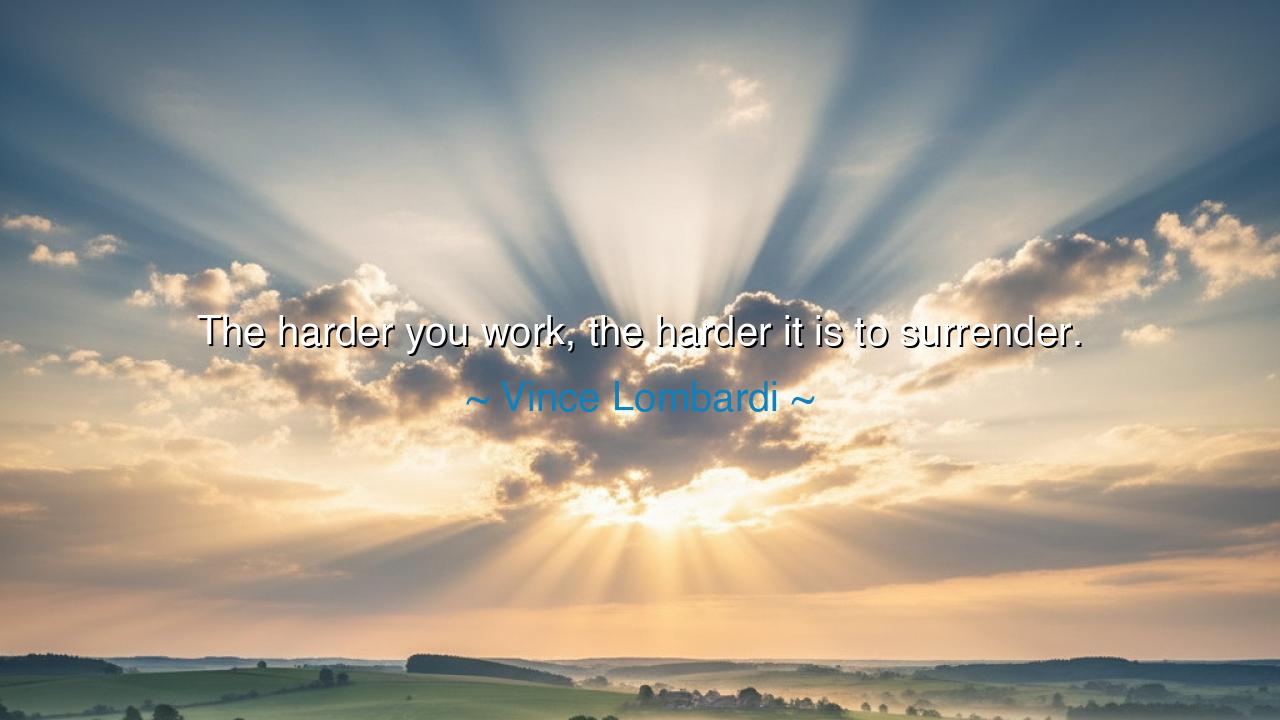
The harder you work, the harder it is to surrender.






In the powerful words of Vince Lombardi, “The harder you work, the harder it is to surrender,” we hear the echo of a warrior’s heart and the eternal spirit of perseverance. This truth speaks of the sacred bond between effort and will, for when one has poured their soul into a task, the thought of defeat becomes unbearable. It is not merely pride that resists surrender, but the deep knowledge of sacrifices made, of countless hours where body and mind were forged like iron in the fires of determination.
The origin of this wisdom lies in the ancient fields of battle and the training grounds of champions. In ages past, warriors would sharpen their swords and their spirits through relentless discipline. The more they worked, the more they became one with their purpose, until retreat was no longer an option. Lombardi, a master of the game of sport, speaks as those ancient generals once did, for the arena of competition is but a reflection of life’s greater struggles. His words remind us that victory is born long before the moment of triumph, in the unseen hours of relentless preparation.
To work hard is to weave a thread between the self and the dream one seeks to achieve. Each drop of sweat and every ounce of effort deepens this connection, making the dream a living part of one’s soul. When such bonds are formed, to surrender would not merely mean giving up a contest, but betraying the very essence of who one has become. Thus, the harder the work, the greater the inner resistance to defeat, for the spirit refuses to abandon what it has built with such devotion.
Let these words be a guiding flame to all who struggle against adversity. In the moments when despair whispers its poisonous lies, remember that your work has given you strength, and your sacrifices have forged your will into an unbreakable blade. To surrender is to let that blade rust in the dark, but to stand firm is to honor every step of the journey. In this way, victory may be claimed—not only over the world, but over the weakness within.






Eertertreter
Vince Lombardi’s quote highlights a key aspect of human nature: the more effort we invest in something, the harder it is to let go, even when it’s clear that continuing might not be the best path. Is this something that comes from our desire for control, or is it more about a fear of failure? How can we cultivate the strength to let go, when we’ve put so much time and energy into a particular outcome?
KLPham Khanh Linh
There’s something quite powerful in Vince Lombardi’s quote—it suggests that the act of working hard creates a kind of emotional investment that can make surrender seem like failure. But is surrendering always a bad thing? Could there be a form of ‘surrender’ that’s more about adaptation and flexibility, rather than giving up? How do we reconcile the value of hard work with the wisdom to know when to pivot or change direction?
LNMai Linh Nguyen
This quote from Vince Lombardi makes me think about how pride and effort can sometimes keep us stuck in a situation longer than necessary. While working hard is admirable, could it create a barrier to reassessing our choices or making changes? How can we develop the self-awareness to know when holding on becomes counterproductive, and when letting go is the smarter move, even after all the effort we’ve put in?
HNHang Nguyen
Lombardi’s words really resonate in a world that often glorifies hard work and relentless pursuit of goals. The idea that the more effort you put in, the harder it is to let go, speaks to the emotional attachment we build with our work. But I wonder, is it possible for the same hard work that fuels success to blind us to the reality that sometimes surrendering is the best choice for growth and progress?
NDKhanh Nguyen Dinh
The quote suggests that hard work creates a sense of ownership and pride, making it difficult to surrender. But does this belief lead to burnout or stubbornness? How do we find a balance between persistence and knowing when to change course? Could this mentality sometimes prevent us from recognizing that stepping back might actually lead to better results in the long run, both personally and professionally?